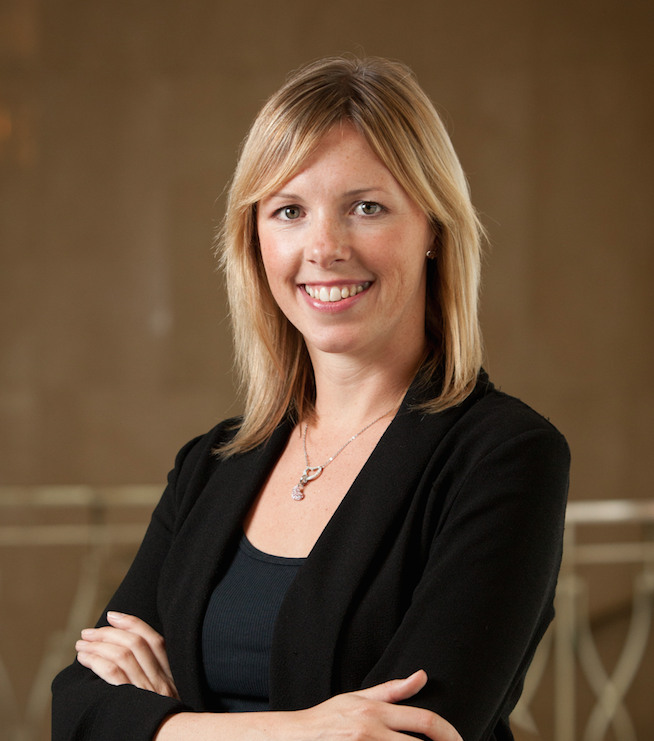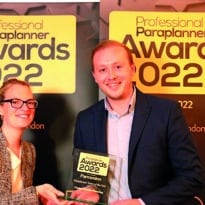Rob Kingsbury talked to Cathi Harrison about how she started and developed outsourced paraplanning firm Para-Sols
Cathi Harrison has been a paraplanner for nine years and has run her own outsourced paraplanning business for seven of those years. In 2014 she became the first paraplanner to become a member director of The Personal Finance Society and to sit on its board, with the aim of raising the profile and support for paraplanners within the professional body.
Yet seven years ago when she set up her company Para-Sols, as a freelance business, she could not have envisaged “ever being where I am today”, she says.
Having left university 2005 she joined a financial advice company as an administrator with a view to becoming a financial adviser “as at the time they seemed like the only two options”, she says. Gradually her role took on paraplanning duties and after three years she moved firms and into a full paraplanning role.
In 2009 the daily commute between Darlington and her job was the catalyst that made her start looking for a position closer to home. At the time, she says, demand for paraplanners just wasn’t as great as it is now and financial advice firms were in the middle of dealing with the Financial Crisis, which meant those she rang who did want a paraplanner just didn’t have the means to take on a full-time employee.
“So I decided to take the leap and become an outsourced paraplanner, working on an hourly rate to get the flexibility I needed,” Cathi says.
With no ready-to-hand clients to help kick-start the business, she needed to create a presence in the market in order to start trading. Having come up with the name North East Paraplanning Services, she realised that would naturally restrict her market and she needed something better. “I was clearing out some old notepads the other day and came across the one where I was trying to find a name for the company. I’d written Paraplanning Solution and then doodled around Par-Sol, which became Para-sols,” she says. The next step was to crate a website and branding. And then it was plain sailing. Except, of course, it wasn’t.
“I started trawling through the FSA register looking for firms based in the north east and then I targeted myself with calling five firms a day, which doesn’t sound like a lot but was the most painful part of setting up. It’s the only time in my life I’ve had to cold call people and I hated it with a passion.”
She had sold her car so she had enough money in the bank to pay her mortgage and bills for three months, and she was waitressing on the side to make ends meet.
“It was literally in the third month when things were getting quite tight when a lady called Flora Maudsley-Barton from Parsonage Financial Planning in Cheshire called to say she’d heard I was a freelance paraplanner and could I do some work for her. She was my very first client.”
While one client was enough to pay the bills it gave Cathi the confidence that she could earn a living as a freelance paraplanner. Flora then referred her to another financial planner, who also referred her and “though I didn’t grow hugely overnight, those referrals helped massively,” Cathi says.
Now, pretty much all Para-Sols business comes from referrals – but paraplanning is in a very different market from just seven years ago. “There so much more awareness of paraplanning these days” Cathi says. “The technology is there now, for communicating and things like secure file sharing. Also, seven years ago not many among advisers felt as comfortable as they do today about using the technology that’s around to work with outsourced paraplanning services.”
Growing into a business
Like many small businesses, Para-Sols grew organically from a freelance operation into a business. “I made all, the usual mistakes,” Cathi admits. “There was just me and I worked on an hourly rate, which of course limited what I could do and earn because there are only so many hours in a day, and with the fear at the beginning of not being able to pay the mortgage I said yes to absolutely everything, which meant I was working all hours and not necessarily doing the kind of work I would have like to have been doing.”
It was when she moved from working at home to a small office and grew even busier that she first thought about looking for someone to help in the business. She met an administrator who wanted to move into paraplanning but was unable to get support from her firm to do so and she became Cathi’s first member of staff.
Which meant Para-Sols had to turn from a freelance operation into a company.
From whence it has grown into a business with two offices and 13 staff.
“It was never a matter of sitting down and saying this is where the business is going and this is where I want to be in five years. It just grew organically as the volume of business grew,” Cathi explains.
In comparison to her journey, nowadays, she says, demand for paraplanning is so much greater than it was back then that anyone setting up a paraplanning business “simply wouldn’t need to do all the cold calling I did or to overly advertise or market their business, which is lovely and quite unusual in any market to have people coming to you.”
The difficulty for businesses now, she adds, is managing the demand and finding the people to help them grow the business, “and by that I mean finding the right employees”.
Challenges for the business now
With general business statistics showing that around 50% of businesses fail in the first five years, there was a psychological uplift from getting through that five-year barrier, Cathi says.
“I feel that we’re in a good place right now. But it’s been seven years of trial and error, learning how to recruit, how to put processes in place, how to manage people in the business as well as clients. As any business owner knows, you crack one problem only to find there’s a new one in its place.
I have nowhere near the number of challenges at present that I’ve had every single year up until now. The biggest issue, not just for us but the industry, is recruitment, as good paraplanners are in short supply.”
Having given the problem a lot of thought, Cathi started a graduate scheme, which took on its first recruits last year. It was a long-term solution to the problem but it is beginning to pay off, she says, as the two recruits are close to completing their diploma and are moving on with their training, “so they are starting to come to fruition and that’s great,” she says.
“We will be bringing on more graduates this year too and in 12 months time they will be at diploma level and we will start to build up that pipeline of qualified paraplanners who are also gaining experience by working in the business. It took time and investment in the graduate scheme and it’s not as easy as it seems to get it off the ground, but now the rewards are beginning to come through.”
Cathi has longer term plans to set up a Paraplanning Academy as another route to get new blood into the industry. “The graduate scheme is our blueprint for the Academy and we want to get it right and iron out the wrinkles before we set out on the bigger project,” she says.
Para-Sols now has offices in Darlington and Leeds. Cathi says she closed down the firm’s London office because as an outsourced business it could operate more cost efficiently outside of London. Instead, she opened the Leeds office, with an eye to the growing financial services market there and graduates from the University.
All Para-Sols paraplanners work in one of the two offices. “For many advisers while they are getting used to working virtually with an outsourced firm, to then have the individual paraplanners scattered around the country would be a step too far, I feel. I think we work better as a business and a team when we are in the office,” Cathi says. It also better fits with the way Para-Sols works, with each client allocated to a ‘hub’, a specific team of people, so that they know when they pick up the phone they can speak to someone who instantly knows who they are and their cases.
Plans for the future
Cathi recently moved the Darlington operation to larger offices to enable the business to expand. Our short-term plans for this year are to train up our new starter and then to take on two more graduates in June. Over the course of the year a new hub will be created and then clients will be taken on to fill that capacity.
And in August, Cathi is expecting a baby. “So I want to get the hub organised and populated and then I might take a week or two off in August,” she says.
Typical day
Describing her typical day Cathi says: “It’s changed a lot over the years. I still do hands-on paraplanning but it tends to be for new firms that are coming on board. We have an onboarding process where we will do a couple of test cases for the company. I’ll chat with the company about their requirements and do the initial report. I want to be sure they are happy with what we do and how we do it and that we’re happy with them as a client. Any member of the team could do the paraplanning just as well as I can but I’m better at knowing who is the right fit for Para-Sols.
“I’ll also do consultancy with adviser firms, for example, around their paraplanning proposition and processes and I oversee our platform due diligence research for advisers.
“The rest of my time is spent answering questions from the team, making sure everything is working properly, developing and generally running the business.”
She admits that there is no need for her to do hands-on paraplanning at this stage in the business’s growth, “but I just really enjoy it,” she says.
Advice to start-ups
Cathi’s advice to anyone looking to start up their own paraplanning business today is:
• Plan what kind of business you want to be – sole trader or business. “The way my company has grown is not the most efficient way of building a business.”
• Plan what kind of adviser business you want to deal with. There is a lot of demand out there, so what would be your ideal client?
• Likewise, work out what kind of financial planning you want to deal with or areas you want to concentrate on. Will you be a general practitioner or specialist?
• Would you prefer to have clients who are geographically close so you can meet with them or are you comfortable only dealing virtually?
• Work out how you will find and attract that kind of client to your business.
• Set up a process from the beginning –even if you are working alone. You don’t want everything just to be in your head, especially when you take on staff.
• Plan where you want to be in 5 years time, so you have as an efficient a road map as possible.





























